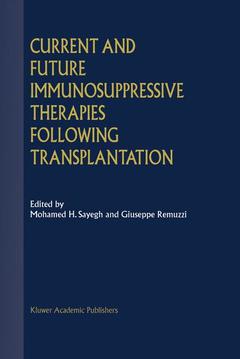Description
Current and Future Immunosuppressive Therapies Following Transplantation, 2001
Coordinator: Remuzzi Giuseppe
Language: English
Subjects for Current and Future Immunosuppressive Therapies Following...:
Current and Future Immunosuppressive Therapies Following Transplantation
Publication date: 09-2012
388 p. · 16x24 cm · Paperback
Publication date: 09-2012
388 p. · 16x24 cm · Paperback
Current and future immunosuppressive therapies following transplantation
Publication date: 09-2001
388 p. · 15.5x23.5 cm · Paperback
Publication date: 09-2001
388 p. · 15.5x23.5 cm · Paperback
Description
/li>Contents
/li>
This title provides a comprehensive and state-of-the-art summary of current and future immunosuppressive strategies in transplantation, with emphasis on the basic science mechanisms and clinical applicability of these strategies. The uniqueness of this book is the inclusion of up-to-date information on the basic mechanisms of actions of the immunosuppressive drugs as well as a summary of the clinical trials data and the potential use of these drugs in clinical organ transplantation. In addition to describing the various immunosuppressive strategies, the book has three special features, including immunosuppression in xenotransplantation, gene therapy approaches, and transplantation tolerance. A group of outstanding investigators have been assembled to write the chapters. The book is intended for the transplant professional and the specialist who wants to stay abreast of the current status of immunosuppression in organ transplantation. The book is also useful for basic scientists who work in the field of transplantation immunology.
Contributors List. I: Introduction. 1. The History of Immunosuppression for Ogan Transplantation; J.C. Hong, B.D. Kahan. 2. Clinical Trials in Transplant Immunosuppression: What Have We Learned? P. Schnuelle, F.J. van der Woude. II: Pharmacological Immunosuppression. 1. Pharmacologic Monitoring of Immunosuppressive Drugs; F. Gaspari, et al. 2. Use of Corticosteroids in Kidney Transplantation; D.E. Hricik. 3. Mycophenolate Mofetil and Azathioprine; J.D. Pirsch, E.D. Neto. 4. Cyclosporine Formulations; V. Ramanathan, H. Helderman. 5. Tacrolimus; R. Shapiro. 6. Sirolimus; B.D. Kahan. 7. New Agents on the Horizon; J. Klupp, R.E. Morris. III: Biologicals. 1. Why Do We Need Induction Therapy? J. Vella, J. Neylan. 2. Polyclonal Antilymphocyte Therapy; P. Morrissey, A.P. Monaco. 3. Monoclonal Antibody Targeting of the T cell Receptor Complex; L. Chatenoud. 4. Monoclonal Antibody Targeting of IL-2R-Complex; F.G. Vincenti. 5. Monoclonal Antibody Targeting of Adhesion Molecules; M.H. Frank, D.M. Briscoe. 6. Costimulation Blocade; R.D. Bloom, L.A. Turka. 7. Immunomodulatory Function of MHC Peptides; B. Murphy, A. Krensky. 8. Tolerance: Is It Time to Move to the Clinic? M.H. Frank, M.H. Sayegh. IV: Gene Therapy. 1. Molecular Medicine in Organ Transplantation: How and When? A. Benigni, et al. 2. Gene Therapy in Organ Transplantation: Applicabilities andShortcomings; J.C. Magee, et al. 3. Immunomodulation Strategies in Xenotransplantation; I.P.J. Alwayn, et al.
© 2024 LAVOISIER S.A.S.




